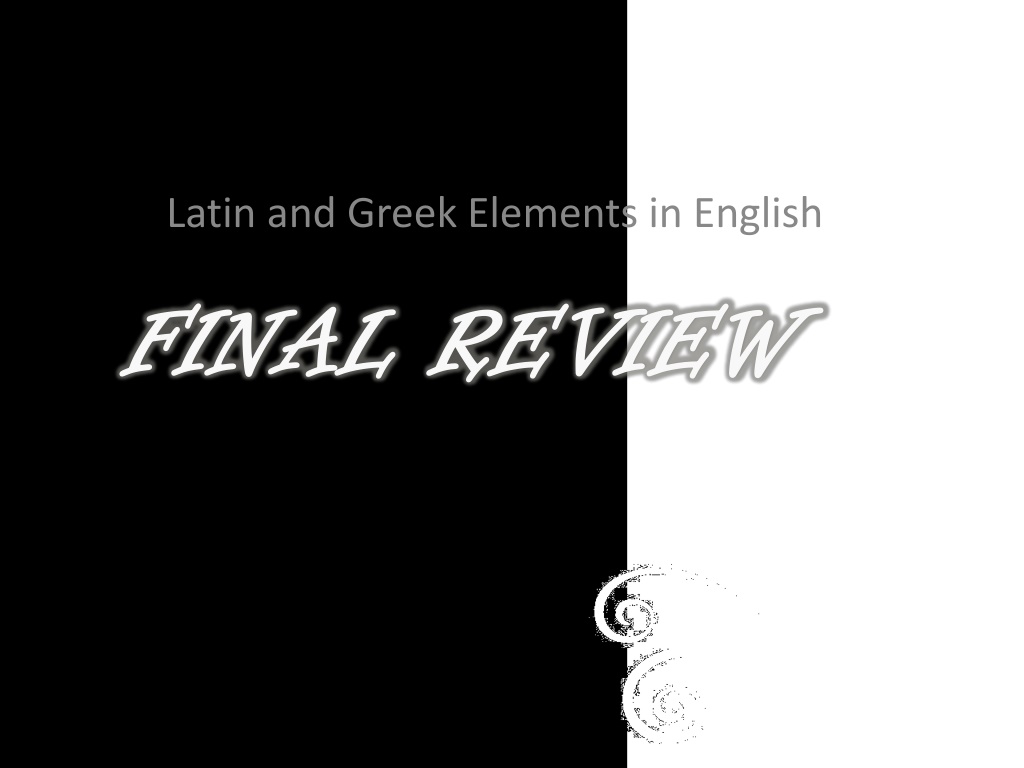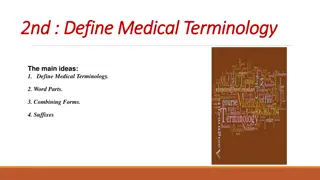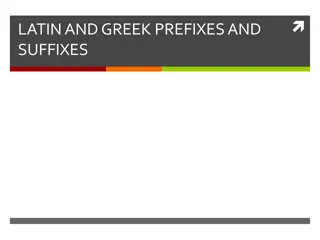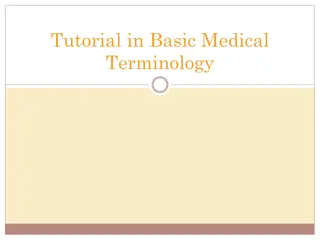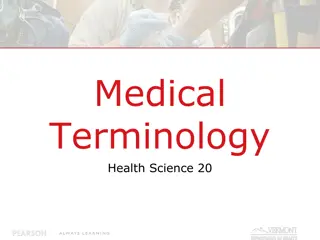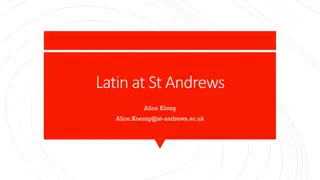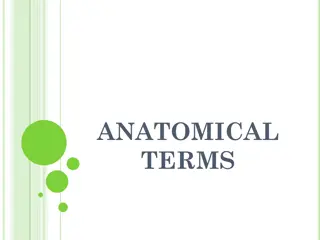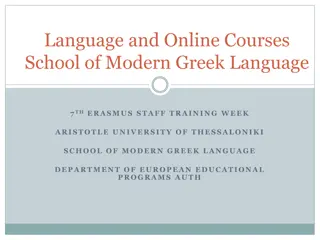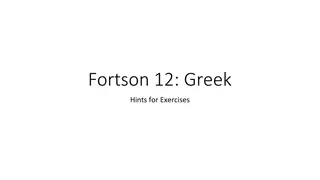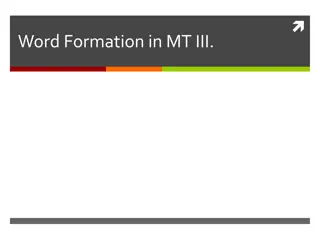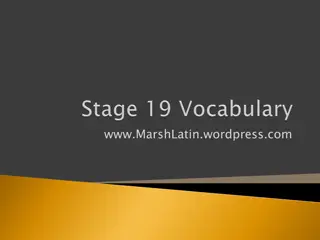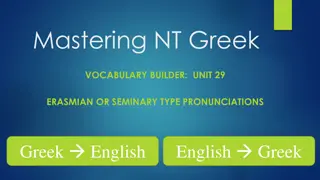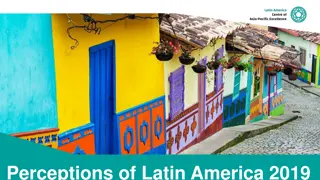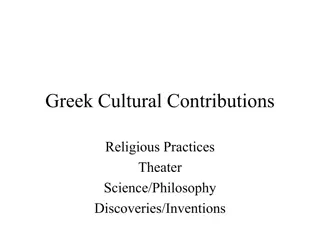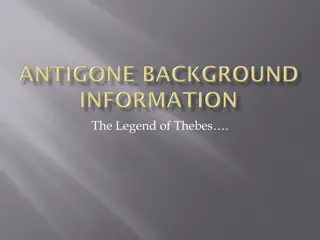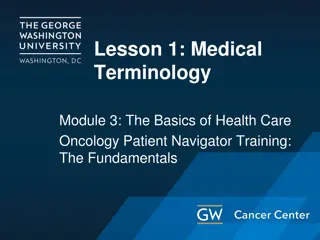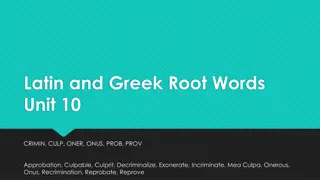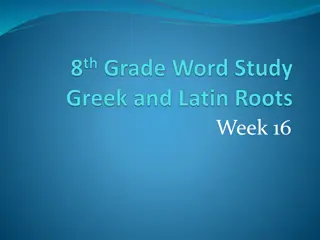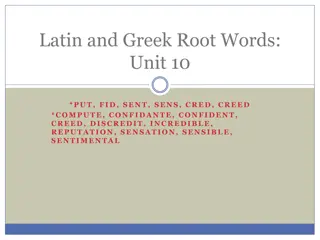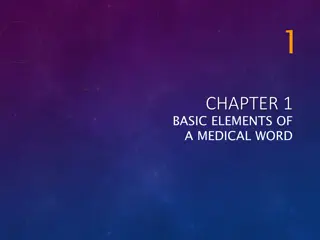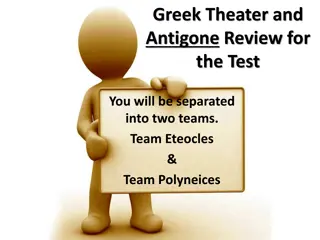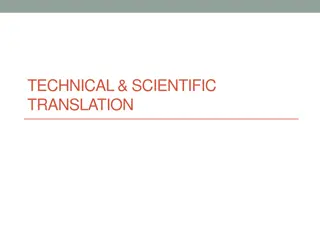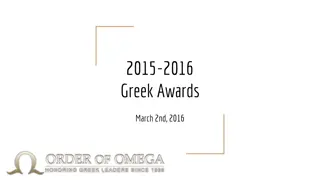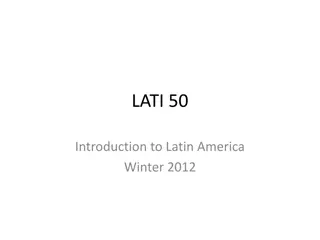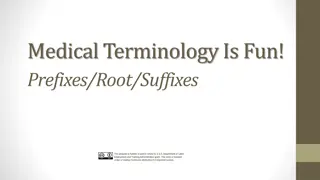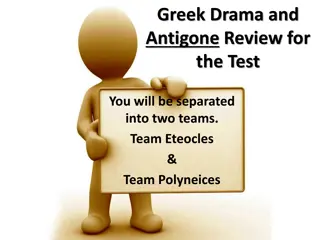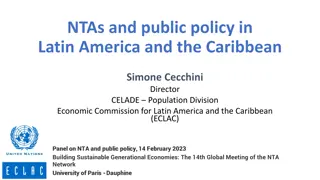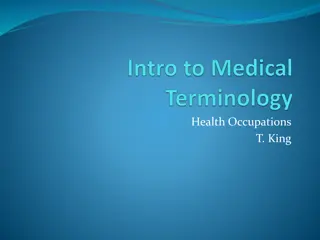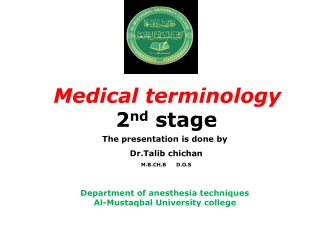Latin and Greek Elements in English - Medical and Scientific Terminology Review
Explore the Latin and Greek elements in English through medical and scientific terminology. Dive into the meanings of terms like perianth, pentamerous, anastomosis, neurasthenia, and more, which offer insights into biological processes and medical conditions.
Download Presentation

Please find below an Image/Link to download the presentation.
The content on the website is provided AS IS for your information and personal use only. It may not be sold, licensed, or shared on other websites without obtaining consent from the author. Download presentation by click this link. If you encounter any issues during the download, it is possible that the publisher has removed the file from their server.
E N D
Presentation Transcript
Latin and Greek Elements in English FINAL REVIEW FINAL REVIEW
MEDICAL AND SCIENTIFIC TERMINOLOGY perianth a. a stony mass in the intestines b. an excess of red blood cells c. the envelope of a flower
MEDICAL AND SCIENTIFIC TERMINOLOGY pentamerous a. consisting of five divisions b. defective formation of bone c. referring to the area between the heart and the diaphragm
MEDICAL AND SCIENTIFIC TERMINOLOGY anastomosis a. a connection between blood vessels b. the condition of having abnormally long finger or toes c. the dissolution of tissue
MEDICAL AND SCIENTIFIC TERMINOLOGY neurasthenia a. a membrane surrounding an embryo b. depression characterized by fatigue and worry c. a lack of muscle tone
MEDICAL AND SCIENTIFIC TERMINOLOGY osteophyte a. an inflammation of the stomach b. a diseased condition of the kidney c. a small bony outgrowth
MEDICAL AND SCIENTIFIC TERMINOLOGY histolysis a. a disorder in metabolism of fat b. the dissolution of tissue c. an x-ray of the bile ducts
MEDICAL AND SCIENTIFIC TERMINOLOGY myocarditis a. a tumor composed of blood vessels b. a cell body of nerves c. inflammation of the walls of the heart
MEDICAL AND SCIENTIFIC TERMINOLOGY gymnorhinal a. referring to a moisture-loving plant b. referring to birds with a nostril region not covered with feathers c. securing food with the tongue
MEDICAL AND SCIENTIFIC TERMINOLOGY hemotoxin a. a substance that destroys red blood cells b. an excessive development of tissue c. a treatment by means of rays
MEDICAL AND SCIENTIFIC TERMINOLOGY empyema a. the ripening of fruits underground b. the study of the effects of radiation on living organisms c. the accumulation of pus in a body cavity
MEDICAL AND SCIENTIFIC TERMINOLOGY prothrombin a. a structure containing minute reproductive bodies b. a substance which counteracts a toxin c. a plasma protein produced in the liver during the clotting of blood
MEDICAL AND SCIENTIFIC TERMINOLOGY acrocarpous a. having bare wings b. referring to a type of plant which bears fruit on the top of its stem c. able to run swiftly
MEDICAL AND SCIENTIFIC TERMINOLOGY ophthalmotonometer a. an instrument for measuring tension within the eyeball b. an instrument for measuring the speed of rotation c. an instrument for measuring variations in temperature
MEDICAL AND SCIENTIFIC TERMINOLOGY dolichomorphic a. having an affinity for the color red b. having a long form c. able to withstand wide variations in pressure
MEDICAL AND SCIENTIFIC TERMINOLOGY parenteral a. p.t. impairment of speech articulation b. unable to see the color blue c. not passing through the digestive tract
LINGUISTIC TERMS illegal, assist, succumb What do these words have in common? repeating consonants ASSIMILATION
LINGUISTIC TERMS acquiescence, convalesce, effervescent What do these words have in common? the letters sc INCHOATIVE
LINGUISTIC TERMS hiss, whizz, growl What do these words have in common? imitation of sounds ONOMATOPOEIA
LINGUISTIC TERMS vote, undertaker, disease What do these words have in common? a narrower meaning than the original meaning SPECIALIZATION
LINGUISTIC TERMS the multitude, a beauty, a terror What do these words have in common? abstract qualities acting as concrete things ABSTRACT-TO-CONCRETE
LINGUISTIC TERMS a titanic effort, mammoth olives, bored to death What do these words have in common? exaggeration HYPERBOLE
LINGUISTIC TERMS deception, efficient, insidious What do these words have in common? a vowel change in the base CAPT- becomes CEPT- FAC- becomes FIC- SED- becomes SID- VOWEL GRADATION
LINGUISTIC TERMS fiddle/viola, compute/count, ray/radius What do these words have in common? derived from the same parent word DOUBLETS
LINGUISTIC TERMS moped, bit, hazmat What do these words have in common? combinations of clips moped = motorcycle + bicycle pedal bit = binary + unit hazmat = hazardous + material BLEND
LINGUISTIC TERMS familiar, sobriety, turtle What do these words have in common? l s and r s changing i s changing to e s (familial, sobriity, turtur) DISSIMILATION
LINGUISTIC TERMS CSI, laser, MASH What do these words have in common? created from the first letters of each word ACRONYM
LINGUISTIC TERMS neutralize, verbal counseling, target- rich area What do these words have in common? round-about way of speaking (military) CIRCUMLOCUTION
LINGUISTIC TERMS mortify, atom, infinite What do these words have in common? have lost their original strength probably due to overuse WEAKENING
LINGUISTIC TERMS an eye for painting, an ear for music, a lot of heart What do these words have in common? concrete body parts used as abstract qualities CONCRETE-TO-ABSTRACT
LINGUISTIC TERMS vaccinate, execute, reune What do these words have in common? a simpler form of a word; have an affix removed BACK FORMATION
LINGUISTIC TERMS audiophile, battleax, superman What do these words have in common? elements from two different languages HYBRID (bad!)
LINGUISTIC TERMS a stiff, an American, the rich What do these words have in common? all adjectives functioning as nouns; two words, one being an article (a, an, the) SUBSTANTIVE
LINGUISTIC TERMS fame, angel, lord What do these words have in common? a positive connotation ELEVATION
LINGUISTIC TERMS full-flowered woman, pass away, restroom What do these words have in common? less direct meanings EUPHEMISM
LINGUISTIC TERMS humble pie, sacrilegious, primrose What do these words have in common? the true meanings have nothing to do with pie, religion, or roses FOLK ETYMOLOGY
LINGUISTIC TERMS exam, quake, lab What do these words have in common? super-short! CLIP
LINGUISTIC TERMS clap-trap, murmur, fake-bake What do these words have in common? repetition of sounds REDUPLICATION
LINGUISTIC TERMS to, too, two What do these words have in common? same pronunciation HOMONYM
LINGUISTIC TERMS rococo, demon, senile What do these words have in common? negative connotation DEGENERATION
WORD DEFINITIONS ruminate a. to wander b. to think over; ponder c. to place in proper position
WORD DEFINITIONS Dutch act a. escape or suicide b. blunt speech c. memorable date
WORD DEFINITIONS termagant a. a useless item b. a funeral song c. a violent, quarrelsome bully
WORD DEFINITIONS miasma a. the masses, commoners b. a really bad smell c. a middleman
WORD DEFINITIONS hedonism a. the pursuit of pleasure b. an aggressive attack c. an accidental stroke of good fortune
WORD DEFINITIONS harbinger a. a wide road b. a large building for sporting events c. a forerunner
WORD DEFINITIONS bantam a. miniature b. with great speed and force c. a risk or danger
WORD DEFINITIONS desultory a. a stimulating rebellion b. jumping from subject to subject c. dejected
WORD DEFINITIONS peripatetic a. expressing sorrow b. typical of country life, rustic c. wandering
WORD DEFINITIONS dicker a. to block legislation b. to bargain c. to be stunned with shock
